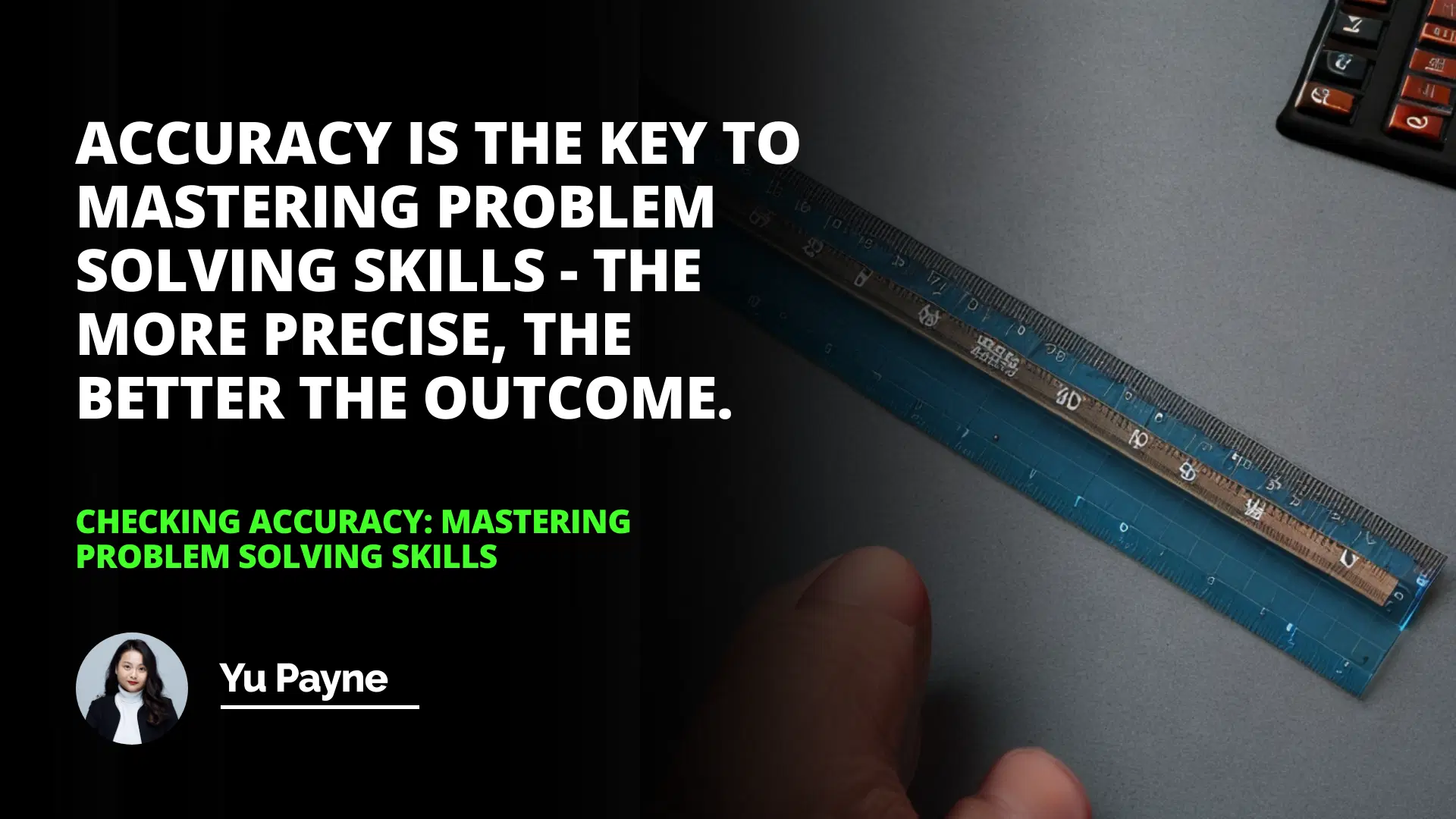
This article discusses the importance of accuracy in problem-solving and how to ensure accuracy. It emphasizes the importance of actively engaging in problem-solving, asking questions, double-checking calculations and diagrams, and comparing the solution to the answer key. Accuracy should be emphasized over speed, and the listener should check the accuracy of each step, not just the final answer.
Introduction
The Importance of Checking Accuracy
Strategies for Checking Accuracy
The Emphasis on Accuracy Over Speed
Conclusion
Introduction: Accuracy is of the utmost importance in problem-solving, and the accuracy of the problem-solver must be checked at every step of the process. This article will discuss the importance of checking accuracy, strategies for doing so, and the emphasis on accuracy over speed. Finally, it will conclude with a summary of the main points.
The Importance of Checking Accuracy
The listener must actively engage in the problem-solving process to ensure accuracy. This means following every step taken by the problem-solver and understanding each step. If the listener takes a passive attitude, they will not be able to catch errors. Additionally, the listener should never let the problem-solver proceed without checking the accuracy of each step. For example, if the problem-solver incorrectly states that the word sentence has nine letters, the listener should immediately catch this error and point it out.
Strategies for Checking Accuracy
There are several strategies that can be employed to check accuracy. First, the listener should ask questions to ensure that the problem-solver is on the right track. This will help the listener to understand the problem-solvers thought process and identify any mistakes. Second, the listener should double-check calculations and diagrams. This will help to ensure that the problem-solver has not made any errors. Finally, the listener should compare the problem-solver solution to the answer key to ensure accuracy.
Comprehensive Guide To Regression Analysis For Quantitative Forecasting
Essential Flow Charting Techniques For Effective Decision-making
The Emphasis on Accuracy Over Speed
It is important to remember that accuracy is more important than speed when problem-solving. Taking the time to ensure accuracy is essential, and it is important to remember that rushing through the problem-solving process can lead to errors. Additionally, it is necessary to remember that accuracy is more important than the final answer. The listener should check the accuracy of each step, not just the definitive answer.
Conclusion: In conclusion, accuracy is of the utmost importance in problem-solving, and the accuracy of the problem-solver must be checked at every step of the process. Therefore, the listener should actively engage in problem-solving, ask questions, double-check calculations and diagrams, and compare the solution to the answer key. Additionally, accuracy should be emphasized over speed, and the listener should check the accuracy of each step, not just the final answer.
Accuracy is the key to mastering problem-solving skills - the more precise, the better the outcome.
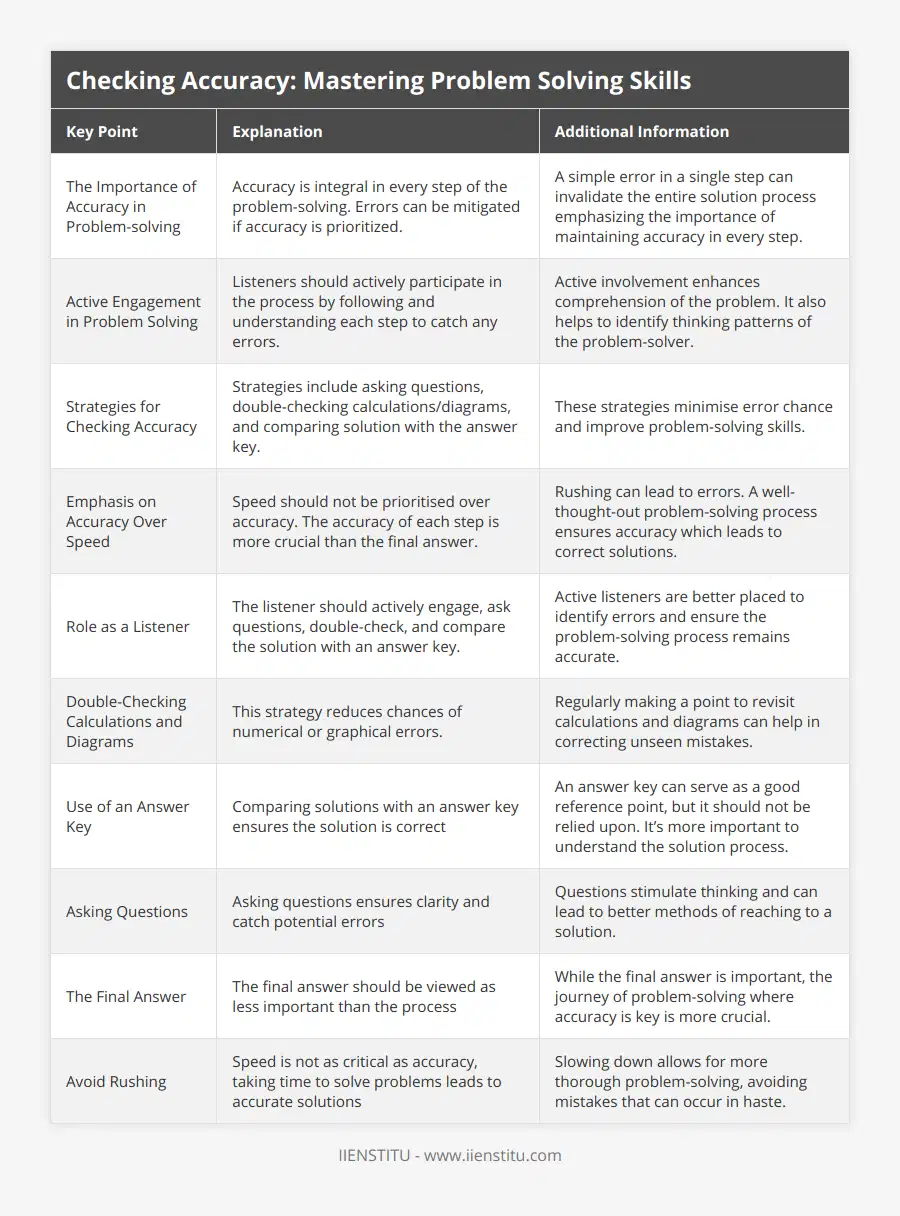
Frequently Asked Questions
What strategies can I use to check accuracy when problem solving?
Problem-solving is an important skill to develop. Accuracy is essential when using this approach, and achieving accuracy when problem-solving can be challenging, as it requires careful consideration of the data and steps taken to reach a solution. In this article, we will explore some strategies that can be used to check accuracy when problem-solving.
The first strategy is to break down the problem into smaller parts. By breaking the problem down into smaller, more manageable steps, it can be easier to spot errors or inconsistencies. Additionally, when each step of the problem is addressed separately, the process can be more systematic and organized, making it easier to identify any mistakes.
Another strategy is to double-check all calculations. When problem-solving, paying attention to any measures made and double-checking them for accuracy is essential. This can be done by either re-doing the calculations or using a calculator to ensure that the numbers are accurate.
It can also be beneficial to have someone else review the work. Having a second set of eyes to study the problem can help to identify any mistakes or inconsistencies that may have been overlooked. Additionally, having a peer review of the work can provide a fresh perspective, which can be helpful when trying to solve a complex problem.
Finally, it is essential to take the time to review the solution. Once a solution has been found, it is necessary to check it to ensure it is correct. This can include going back over the steps of the problem and verifying that the solution is consistent with the data provided.
Overall, problem-solving can be challenging, and accuracy is essential when using this approach. BFollowingthe strategies outlined in this article makes it easier to check accuracy when problem-solving. For example, breaking down the problem into smaller parts, double-checking all calculations, having someone else review the work, and taking the time to review the solution can all help to ensure accuracy when problem-solving.

How can I ensure that I am checking accuracy without sacrificing speed?
Checking accuracy is essential to any task, from writing a paper to preparing a meal. However, despite the importance of accuracy, it is often necessary to complete tasks quickly to meet deadlines. This means that it is essential to be able to check accuracy without sacrificing speed.
Automation is one of the most effective ways to ensure accuracy without sacrificing speed. Automation can reduce the amount of time spent on tasks and improve accuracy by reducing the potential for human error. For example, using a spreadsheet to calculate equations automatically saves time and reduces can save time and reduce possible errors. Automation can also be used to compare data sets, check to perform the spell, and other tasks that require accuracy.
Another way to ensure accuracy without sacrificing speed is to use a checklist. A checklist can help confirm accuracy by providing a list of items that need to be completed to complete a task. An index also serves as a reminder to double-check the accuracy of each item on the list. This can be especially useful for jobs requiring multiple steps or accuracy in various areas.
Finally, it is essential to take the time to review work before submitting it. This can help identify any errors or inaccuracies before completing the task. Taking the time to review work is especially important for jobs that require accuracy, such as writing a paper or preparing a report.
In conclusion, accuracy is an essential part of any task. However, it is often necessary to complete tasks quickly to meet deadlines. Automation, checklists, and taking the time to review work can all help to ensure accuracy without sacrificing speed. Using these methods makes it possible to complete tasks quickly and accurately.
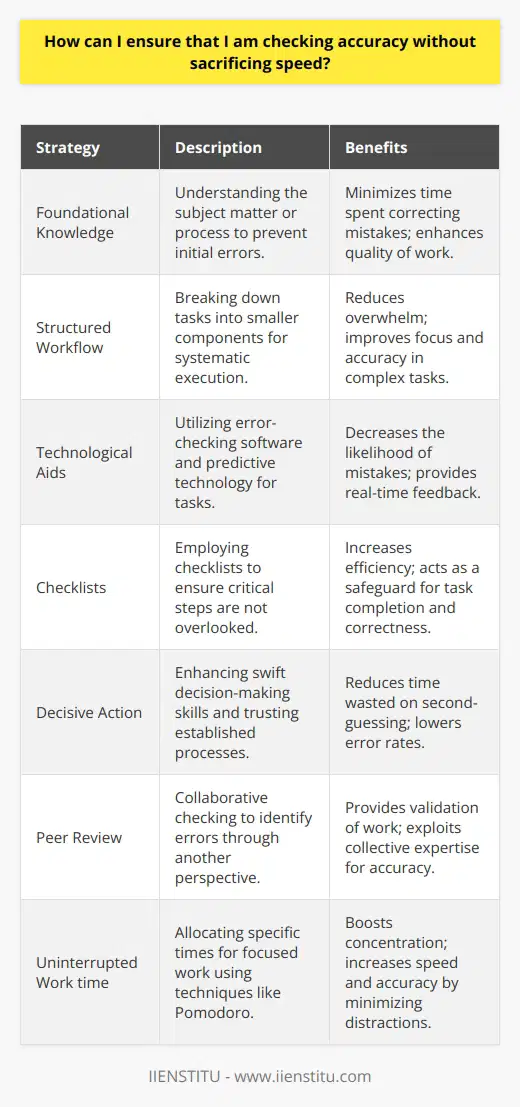
How can I develop my problem solving skills to ensure accuracy?
Problem-solving is an essential skill that can be developed to ensure accuracy in everyday life. It involves the ability to recognize, analyze and resolve problems and is a valuable tool for anyone who needs to make decisions and solve complex issues. In this article, we will discuss some strategies that can be employed to help develop problem-solving skills and ensure accuracy in the process.
The first step in developing problem-solving skills is to identify the problem. This can be done by analyzing the situation, looking for patterns, and identifying the underlying causes of the pain. Once the problem has been identified, it is essential to break it down into smaller, more manageable parts. By breaking the problem down into smaller pieces, it will be easier to analyze and understand the details of the problem.
Once the problem has been identified and broken down, the next step is to develop a plan of action. This plan should include a list of possible solutions and an evaluation of each key in terms of viability and practicality. In addition, it is essential to consider the consequences of each action and determine which solution will yield the best results.
Another critical factor in developing problem-solving skills is practice. This can be done by engaging in activities that require problem-solving, such as puzzles or riddles. Practicing problem-solving in this way will help to hone the skills necessary to solve problems effectively.
It is also essential to stay organized. Keeping a record of the steps taken to solve a problem can help ensure accuracy, as it will help to ensure that the actions taken are correct. Additionally, it is essential to stay focused on the issue at hand and avoid getting distracted by extraneous information.
Finally, taking breaks when needed and practicing mindfulness is essential. Taking time to reflect on the problem and clear the mind of any extraneous thoughts can help to ensure accuracy in the problem-solving process.
In conclusion, problem-solving is an essential skill that can be developed to ensure accuracy. By following the strategies outlined in this article, it is possible to improve problem-solving skills and increase accuracy in the process.
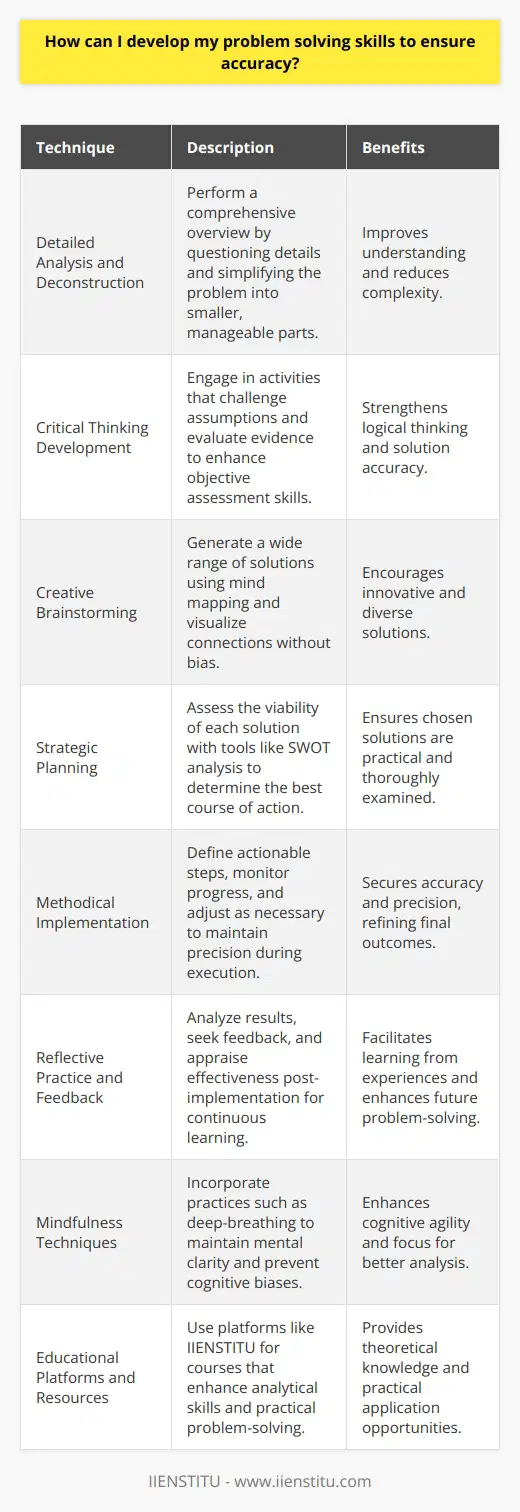
How do you evaluate problem solving skills?
Evaluating Problem Solving Skills
Assessment Methods
To evaluate problem solving skills, an effective approach involves using various assessment methods. These methods may include tests, projects, interviews, or real-life simulations requiring the application of problem-solving techniques.
Objective and Subjective Assessments
In objective assessments, the evaluator assigns specific criteria to measure an individual's performance in problem-solving tasks. These criteria can be in the form of numerical points, grades, or ratings. Subjective assessments, on the other hand, rely on the evaluator's interpretation of the individual's performance.
Rubric Development
A rubric, which is a scoring tool, can provide a more structured method of assessment. It allows the evaluator to outline specific criteria and set levels of performance for each criterion. Developing a comprehensive rubric ensures that the evaluation of problem-solving skills remains consistent and thorough.
Observation of Process
Another critical aspect of evaluating problem-solving skills is observing the process the individual employs to reach a solution. This observation may include the individual's ability to gather information, analyze scenarios, identify options, and implement solutions. Observing the problem-solving process provides insight into the individual's strategic thinking and adaptability.
Reflection and Feedback
Incorporating self-reflection and feedback in the evaluation process further enhances one's understanding of their problem-solving abilities. Encouraging individuals to critically assess their problem-solving processes allows them to identify challenges, areas for improvement, and opportunities for growth. Additionally, evaluators can provide constructive feedback to support the individual’s development and refinement of their problem-solving skills.
Continuous Improvement
Evaluating problem-solving skills is not a one-time process. Continuous improvement is vital, as individuals learn and grow in various aspects of their lives or careers. Regular assessments and evaluations, combined with feedback and reflection, can help monitor progress and make adjustments to support individuals in overcoming challenges and enhancing their problem-solving capabilities.
In conclusion, evaluating problem-solving skills requires a multifaceted approach that includes utilizing varied assessment methods, employing rubrics, observing the problem-solving process, and encouraging reflection and feedback. This comprehensive method ensures that individuals have the opportunity to continuously improve their problem-solving skills, adapting to different situations and scenarios.
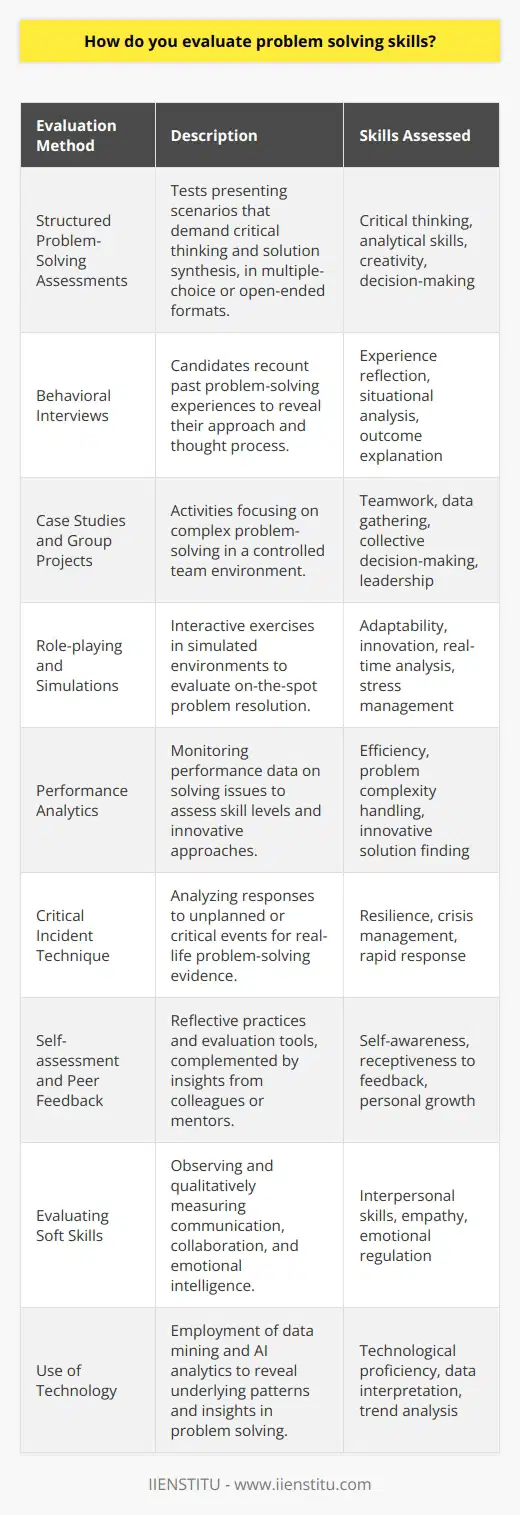
What are the 4 problem solving skills?
Problem Solving Skill 1: Identifying the Problem
The first problem-solving skill is accurately identifying the problem. Recognizing what needs to be resolved is crucial to developing an effective plan for addressing an issue in a systematic manner.
Problem Solving Skill 2: Analyzing Possible Solutions
Once the problem is identified, the second skill is to analyze and evaluate possible solutions. This process requires critical thinking to consider various alternatives and assess the potential outcomes of each. Selecting a course of action demands evaluating the feasibility, suitability, and potential consequences of possible strategies.
Problem Solving Skill 3: Implementing a Solution
The third skill is the ability to implement a chosen solution with determination and focus. This stage includes creating a plan, establishing clear tasks and responsibilities, and applying appropriate resources. Effective implementation requires adaptability and flexibility to navigate potential obstacles and make adjustments if necessary.
Problem Solving Skill 4: Monitoring Progress and Evaluating Results
Finally, the fourth skill involves monitoring progress and evaluating the results of the implemented solution. This step requires tracking performance, analyzing data, and determining if the chosen strategy is achieving the desired outcome. If the results are not satisfactory, it may be necessary to revisit previous steps and employ alternative methods to resolve the problem successfully.
In conclusion, effective problem-solving depends on one's ability to identify, analyze, implement, and evaluate solutions. By strengthening these four essential skills, individuals can approach challenges with confidence and ultimately achieve better results in their personal and professional lives.
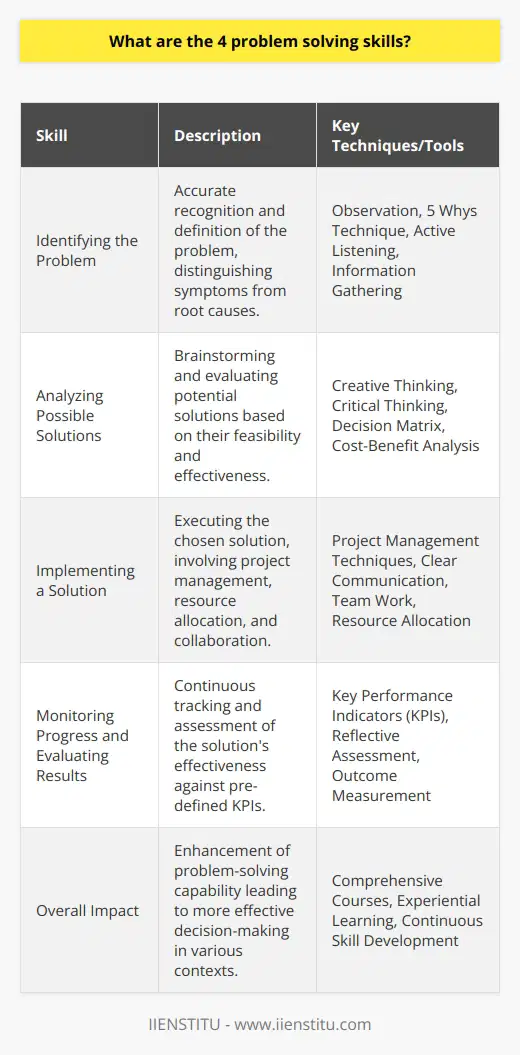
How do you describe problem solving skills on a resume?
Identifying Problem Solving Skills
Problem solving skills are a valuable asset to include on a resume, as they demonstrate one's ability to address challenges and find solutions in difficult situations. By highlighting specific instances of these skills in action, job candidates can provide a clear picture of their capabilities to prospective employers.
Using Relevant Keywords
To effectively incorporate problem-solving skills into a resume, it is essential to use appropriate keywords that resonate with hiring managers. Examples of such terms include 'analytical thinking,' 'logical reasoning,' 'troubleshooting,' 'conflict resolution,' and 'root cause analysis.' These phrases highlight a job seeker's ability to identify and resolve problems, conveying their value to potential employers.
Quantifying Success Stories
In order to demonstrate the effectiveness of one's problem-solving skills, it is crucial to provide concrete examples that quantify the positive impact these abilities have had in previous professional experiences. One approach is to detail situations where the application of problem-solving skills led to tangible results, such as cost savings, improved efficiency, or product enhancements. In doing so, the job candidate effectively showcases their ability to generate favorable outcomes.
Emphasizing Relevant Experience
When detailing problem-solving skills on a resume, it is essential to be specific in describing how these abilities have been utilized in the past. This can include outlining processes by which potential problems have been identified and addressed, as well as elaborating on how one has been resourceful in finding alternative solutions to unexpected challenges. By presenting these experiences in detail, the applicant proves to potential employers that their problem-solving skills are both valuable and applicable to a variety of circumstances.
Highlighting Collaborative Efforts
Problem-solving often involves teamwork, so it is important for job seekers to emphasize their ability to collaborate with others on finding solutions. This can be done by showcasing instances where the job candidate effectively worked with colleagues to resolve a difficult situation, or by discussing instances where they played a role in fostering communication and cooperation among team members.
In conclusion, effectively describing problem-solving skills on a resume requires using relevant keywords, quantifying success stories, emphasizing relevant experiences, and highlighting collaborative efforts. By incorporating these elements into a resume, job seekers can make a strong case for their ability to tackle challenges and contribute positively to any professional environment.
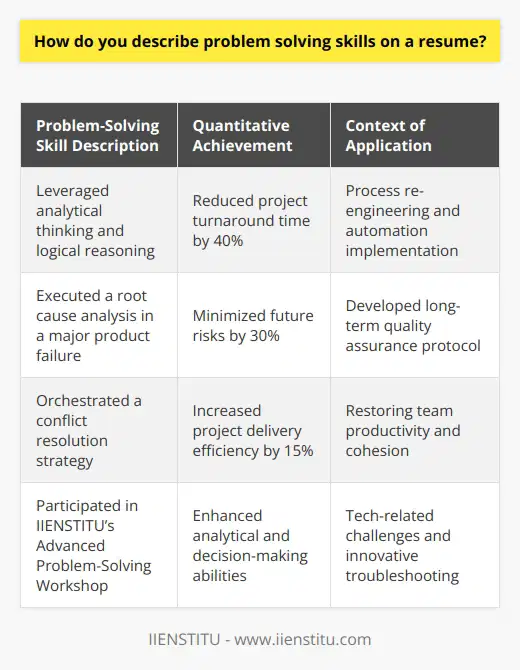
How can I measure my problem-solving skills?
Assessing Problem-Solving Ability
To measure problem-solving skills, one must first understand the key components that comprise this cognitive process. The problem-solving process consists of several stages, namely: identifying the problem, defining the problem, formulating a strategy, evaluating potential solutions, and implementing the chosen solution.
Establishing Evaluation Criteria
The first step to assessing problem-solving skills is to define the desired criteria for evaluation. In general, effective problem solvers can accurately interpret problem situations, identify key elements, and establish the goal or desired outcome. They approach problems systematically, persist through challenges, and adapt their approach when necessary. Based on these general characteristics, specific indicators can be devised to measure one's problem-solving skills.
Self-reflection and Self-assessment
One useful method for measuring problem-solving skills is through self-reflection and self-assessment. Individuals can rate their comfort level and effectiveness in various problem-solving situations, as well as identify their strengths and areas for improvement. They can also examine their past experiences in problem-solving by analyzing their approach and the outcomes that emerged due to their actions. This reflection process can lead to increased self-awareness and better understanding of one's problem-solving capabilities.
Objective Measures
In addition to self-assessment, various objective measures can be used to gauge problem-solving skills. Standardized tests, such as the Watson-Glaser Critical Thinking Appraisal, can assess an individual's ability to analyze, interpret, and evaluate complex information. Participating in problem-solving tasks, such as group exercises or case studies, can also provide clear evidence of one's ability to navigate challenging situations, as the outcome of these tasks can be evaluated by others, either by peers or experts.
Monitoring Progress Over Time
Finally, tracking one's problem-solving skills over time can provide valuable insight into growth and development. By consistently participating in problem-solving activities and reflecting on the outcomes, individuals can monitor their progress and develop strategies for improvement. This long-term approach enables individuals to refine their skills and become more effective problem solvers over time.
In conclusion, measuring problem-solving skills requires a combination of self-reflection, objective assessment, and consistent monitoring of progress. By evaluating their own abilities in relation to established criteria, engaging in problem-solving tasks, and keeping track of their growth, individuals can effectively measure and enhance their problem-solving skills.
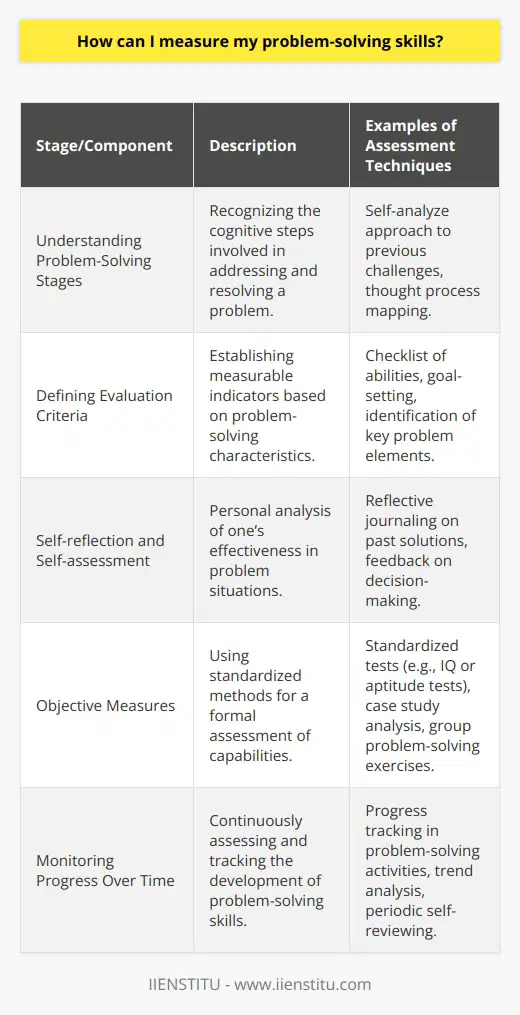
What is accuracy in problem-solving?
Defining Accuracy in Problem-Solving
Accuracy in problem-solving refers to the degree to which the solution of a problem corresponds to the true or correct answer. It is an essential aspect of effective problem-solving, as reaching an accurate solution ensures that the underlying issue is fully addressed, and that the response is effective and appropriate.
Factors Affecting Accuracy
Several factors can impact the accuracy of problem-solving, including knowledge and skills, the complexity of the problem, and the availability of relevant information. A solid understanding of the subject matter, as well as proficiency in analytical and critical thinking skills, is crucial for providing accurate solutions. Additionally, a comprehensive and accurate representation of the problem is necessary to ensure that the solver fully understands the issue at hand, thereby increasing the likelihood of arriving at a correct solution.
Strategies to Improve Accuracy
Employing strategies to enhance the accuracy of problem-solving can be beneficial for individuals and groups working to address complex issues. One such strategy involves gathering sufficient and reliable data, which can help support the problem-solving process, providing a strong foundation for arriving at accurate conclusions. Another approach is to engage in collaborative problem-solving, in which the perspectives and expertise of multiple individuals can contribute to a more thorough and accurate understanding of the problem, leading to more informed and precise solutions. Lastly, it is crucial to continuously evaluate and reflect upon the problem-solving process, as this can help identify any gaps in knowledge, clarify misunderstandings, and refine the solution as needed.
Instilling a Focus on Accuracy
For individuals, organizations, and institutions, placing a strong emphasis on accuracy in problem-solving is essential for achieving optimal outcomes. This can be achieved by fostering a culture of continuous learning, resilience, and adaptability, allowing individuals to expand their knowledge, acquire new skills, and adapt to changing circumstances. Encouraging open communication, collaboration, and feedback can also promote a shared sense of responsibility for identifying problems, generating accurate solutions, and refining those solutions as needed.
In conclusion, accuracy in problem-solving is a vital factor in successfully addressing various issues, regardless of context or domain. By enhancing knowledge and skills, employing effective strategies, and fostering a focus on accuracy within a problem-solving environment, individuals and organizations can ensure they are well-equipped to tackle complex problems with precision and effectiveness.
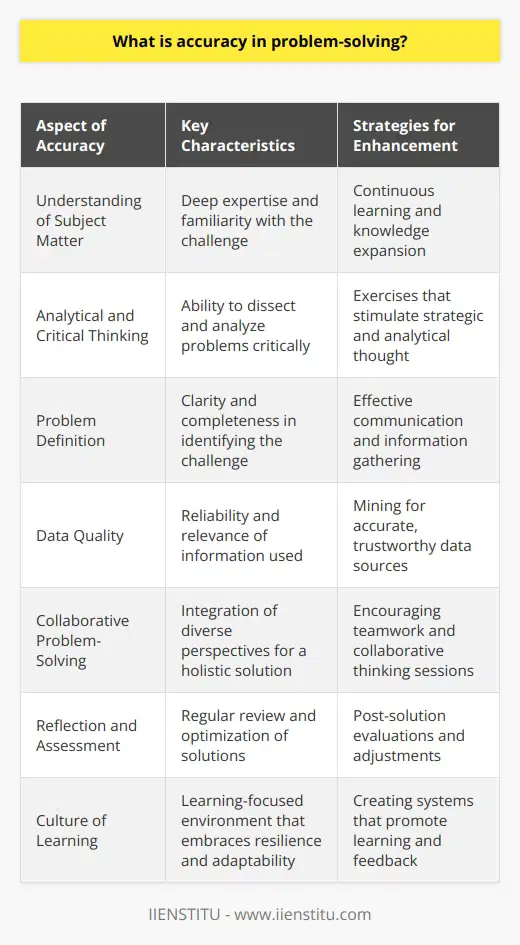
How can you improve accuracy in solving problems?
**Identify the Problem Clearly**
Improving accuracy in problem-solving begins with properly identifying the issue at hand. Clearly defining a problem helps in determining the desired outcome and understanding the criteria that the solution must meet. This clarity facilitates finding accurate and effective ways to resolve the issue.
**Break Down Complex Problems**
Complex problems often require breaking down into smaller, manageable components. When problems are decomposed into smaller parts, it becomes easier to analyze and solve each sub-problem. Consequently, focusing on smaller parts can lead to a more accurate overall solution.
**Use Systematic Approaches**
Systematic approaches, such as algorithms and heuristics, can aid in improving accuracy during problem-solving. These structured methods allow for consistent steps and results, minimizing errors and inconsistencies throughout the solution process. Additionally, utilizing established techniques means benefitting from the knowledge of experts and their prior experiences with similar problems.
**Employ Critical Thinking Skills**
The application of critical thinking skills is vital for improving accuracy in problem-solving. This involves questioning assumptions, evaluating evidence, detecting biases, and considering alternative perspectives. Critical thinking allows the problem solver to make well-informed decisions, which in turn contribute to more accurate solutions.
**Learn from Mistakes**
Mistakes are inevitable when solving problems. To improve accuracy, it is essential to recognize and analyze errors to understand their root causes. Learning from mistakes is a valuable opportunity for growth and refinement of problem-solving skills. Furthermore, applying the lessons learned from past experiences increases the likelihood of achieving more accurate solutions in the future.
**Seek External Advice**
Collaborating with others or consulting external sources can also lead to more accurate solutions. Different perspectives and expertise can provide new insights, challenge existing ideas, and help avoid potential pitfalls. By involving others and actively seeking alternative viewpoints, problem solvers can ensure a more thorough examination of the issue, resulting in improved accuracy.
In conclusion, to improve accuracy in problem-solving, one must clearly identify the problem, break down complex issues, use systematic approaches, employ critical thinking skills, learn from mistakes, and seek external advice. Adopting these strategies will foster the development of precise and effective solutions, ensuring successful resolution of various problems.
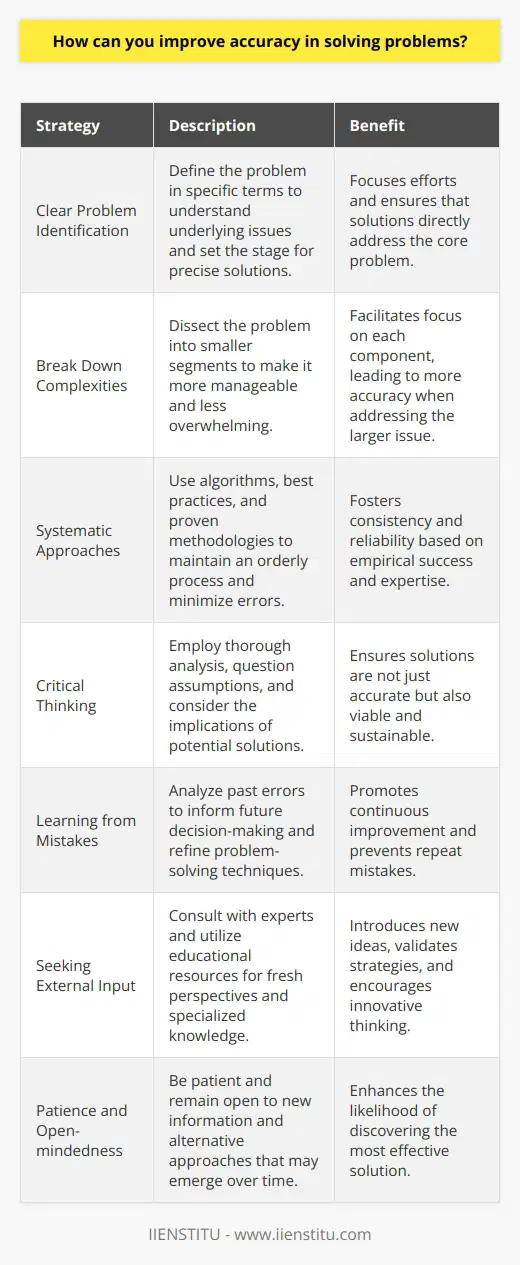
What are the components of an effective problem-solving process?
Components of an Effective Problem-solving Process
Identifying the Problem
An effective problem-solving process commences with the accurate identification of the problem. This step requires a clear understanding of the issue at hand to ensure that the chosen solution directly addresses its root cause, preventing wasted effort and potential misdirection of resources.
Research and Analysis
After identifying the problem, thorough research and analysis are undertaken to gather relevant information and identify potential solutions. This process involves researching previous similar problems, analyzing possible outcomes, and considering alternative strategies to address the issue.
Generating Possible Solutions
In this phase, multiple viable solutions for the problem are generated through brainstorming, collaboration, and creative thinking. Exploring a wide range of ideas allows for the identification of diverse perspectives and potential solutions that may not have been immediately obvious.
Evaluating Potential Solutions
Once several solutions have been proposed, a systematic evaluation process is implemented to determine the most effective option. This involves assessing each potential solution based on relevant criteria, such as feasibility, cost, expected outcomes, and potential risks. The evaluation process aids in refining solution proposals and selecting the most appropriate intervention for the problem at hand.
Implementing the Selected Solution
After the most suitable solution has been chosen, an implementation plan is developed to ensure the effective execution of the decision. This plan helps to establish timelines, allocate resources, define roles, and ultimately, facilitate the successful application of the chosen solution to the identified problem.
Monitoring and Review
The final component of the problem-solving process is monitoring the solution's effectiveness and reviewing its outcomes. This step involves tracking progress, gathering feedback, and conducting regular evaluations to identify any necessary adjustments. This continuous process of monitoring and review helps to ensure that the deployed solution achieves its intended results, ultimately resolving the initial problem effectively and efficiently.
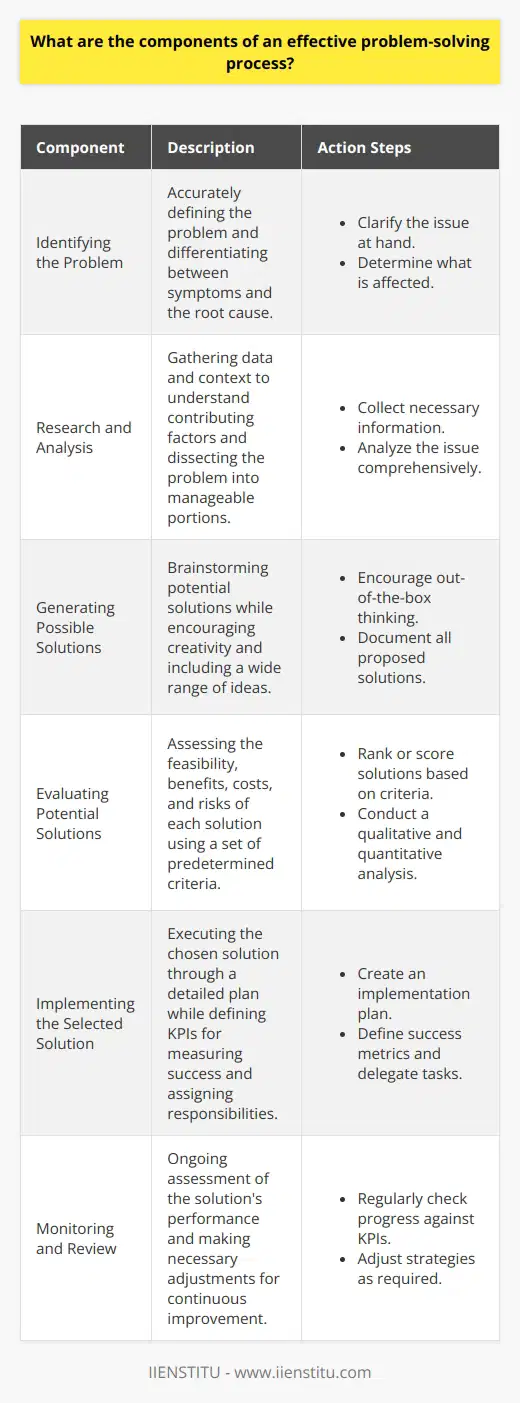
How can cognitive biases affect problem-solving outcomes and what can be done to minimize their impact?
Impact of Cognitive Biases on Problem-solving Outcomes
Cognitive biases can greatly influence problem-solving outcomes by leading individuals to make irrational decisions based on inaccurate information or assumptions. For instance, confirmation bias could cause individuals to only seek out information that supports their pre-existing views. By doing so, they may disregard valuable evidence that contradicts their beliefs, thus limiting their ability to identify the most effective solution to a given problem.
Anchoring Bias and its Detrimental Effects
Another common cognitive bias that affects problem-solving outcomes is anchoring bias. This bias occurs when an individual relies too heavily on an initial piece of information, such as an initial price or estimate, to make subsequent decisions. In this case, the individual fails to properly evaluate additional information and may ultimately choose a suboptimal solution due to their anchoring on the initial information.
Addressing Groupthink and Overconfidence
Groupthink and overconfidence are additional cognitive biases that can undermine the problem-solving process. Groupthink occurs when a collective desire for harmony within a group leads to poor decision-making and suppression of dissenting opinions. Overconfidence, on the other hand, refers to the tendency to overestimate one's abilities and knowledge when dealing with a problem, which may result in overlooking critical information or making errors in judgment.
Strategies for Minimizing Cognitive Biases
To reduce the impact of cognitive biases on problem-solving outcomes, individuals should develop a heightened awareness of their own thinking patterns and potential biases. This self-awareness can facilitate the identification and correction of biased thinking. Furthermore, encouraging diverse perspectives and engaging in open-minded discussions can help counteract the effects of groupthink and foster more balanced approaches to problem-solving. Additionally, employing decision-making tools and techniques, such as cost-benefit analysis or pro-con lists, can provide a more objective assessment of potential solutions and alleviate the influence of anchoring or confirmation biases.
In conclusion, cognitive biases can significantly impact problem-solving outcomes, leading individuals and groups to make poor decisions based on distorted perceptions or assumptions. By acknowledging and actively addressing these biases through self-awareness, open-mindedness, and objective decision-making techniques, their effects can be minimized, and more effective problem-solving strategies can be developed.
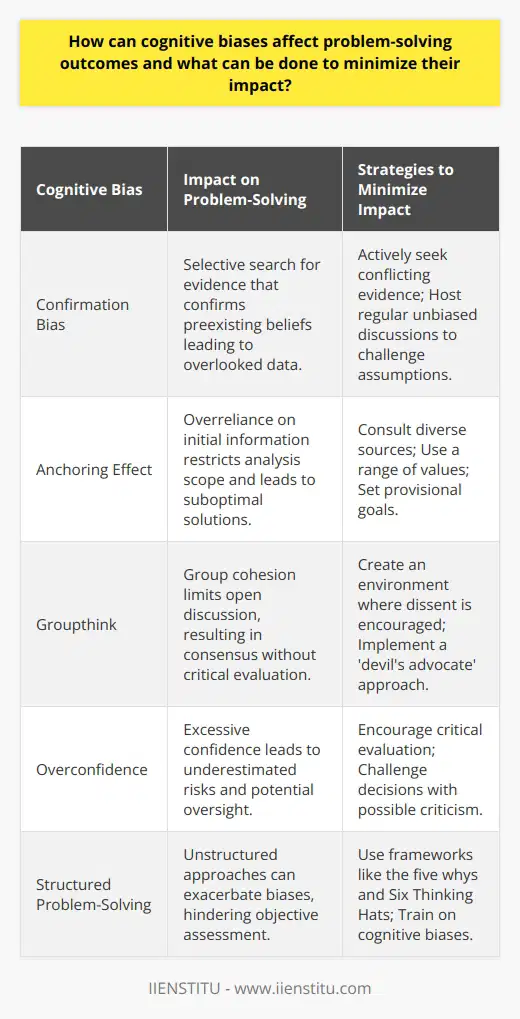
What role does critical thinking play in developing and enhancing problem-solving skills?
The Role of Critical Thinking in Problem-Solving
Fundamental Connection
Critical thinking plays an invaluable role in developing and enhancing problem-solving skills, as it serves as the foundation for effective problem-solving. It involves the evaluation and analysis of information that leads to well-founded, unbiased, and informed decisions. This process is critical for identifying problems, uncovering hidden issues, framing questions, and developing innovative solutions.
Logical Analysis and Reasoning
Applying critical thinking in problem-solving involves utilizing logical analysis and reasoning. These skills are necessary for determining the validity and reliability of information, identifying assumptions, and discerning between fact and opinion. Additionally, critical thinking helps learners to analyze the structure of arguments, detect fallacies, and evaluate the reasoning behind different viewpoints. This ability to critically assess information strengthens problem-solving skills, enabling individuals to approach problems in an informed, systematic manner.
Creative and Divergent Thinking
Another key aspect of critical thinking is fostering creativity and divergent thinking. This involves generating multiple perspectives, ideas, and solutions to address complex problems. Through the use of questioning techniques, brainstorming, and engaging with diverse perspectives, critical thinkers are better equipped to develop original, effective solutions. In turn, this enhances their ability to assess the feasibility and consequences of their actions, resulting in informed decision-making and improved problem-solving abilities.
Intellectual Humility and Open-mindedness
Critical thinking also demands intellectual humility and open-mindedness. It requires individuals to recognize their limitations, perspectives, and biases, encouraging them to consider alternative viewpoints and solutions. The willingness to re-evaluate one's beliefs, assumptions, and understanding in the light of new information and experiences is an essential trait for effective problem-solving.
Cultivating Problem-Solving Skills
In conclusion, critical thinking is a fundamental aspect of developing and enhancing problem-solving skills. By employing logical analysis and reasoning, encouraging creativity and divergent thinking, and maintaining intellectual humility and open-mindedness, critical thinkers are better equipped to tackle complex problems and develop innovative, informed solutions. To cultivate these skills, educational institutions and training programs should emphasize the importance of critical thinking and integrate its principles into their curricula. This focus on developing strong critical thinkers will ultimately lead to more capable problem solvers and better decision-makers.
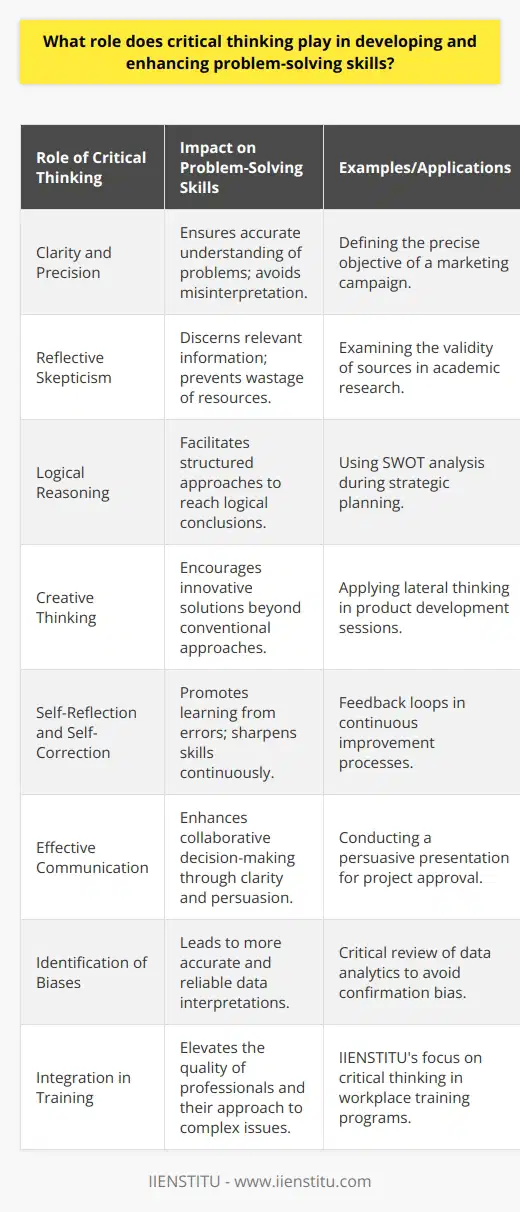
How do you master problem-solving skills?
Developing Essential Components of Problem-Solving Skills
To master problem-solving skills, one should focus on cultivating essential components, such as critical thinking, creativity, decision-making, and communication. First and foremost, critical thinking is the foundation upon which problem-solving skills are built, and it involves analyzing and assessing the situation at hand, as well as identifying possible solutions and the potential consequences of each. Actively engaging in intellectual activities, such as puzzles or brainteasers, reading, and participating in group discussions or debates, can strengthen one's critical thinking abilities.
Fostering Creativity and Innovation
Another important aspect of problem-solving is creativity. By implementing innovative approaches to a problem, one may find a more effective or efficient solution. To foster creativity, individuals should immerse themselves in diverse industries or disciplines, engage in brainstorming sessions, and not shy away from unconventional ideas. Encouraging 'out-of-the-box' thinking and embracing novelty can lead to the development of unique solutions not previously considered.
Emphasizing Decision-Making Skills
Decision-making skills are crucial in the problem-solving process, as they involve determining the best course of action after analyzing multiple solutions. To improve decision-making abilities, individuals should deliberate upon their choices through a systematic evaluation, considering potential outcomes and risks. Additionally, one should practice making sound decisions in a timely manner, as procrastinating or prolonging the decision-making process may hinder an effective resolution.
Strengthening Communication and Collaboration
Effective communication is essential in problem-solving, as it can facilitate collaboration among team members, which, in turn, can generate new ideas or perspectives. Active listening, clear and concise expression of thoughts, and open-mindedness to others' opinions are vital for successful communication. Engaging in group projects, attending workshops, or joining public speaking clubs can aid in improving these skills.
Learning from Experience and Reflective Practice
Mastering problem-solving skills can also be achieved through experiential learning and reflective practice. By analyzing past experiences or challenges, individuals can gain valuable insights into how they approached problems, what worked, and what did not. Reflecting upon successes and failures enables one to calibrate their problem-solving methods, refine their skills, and adapt to evolving circumstances.
In conclusion, mastering problem-solving skills involves a multi-faceted approach, encompassing critical thinking, creativity, decision-making, and communication development. By actively engaging in these areas and learning from experience, individuals can enhance their ability to tackle complex issues, actively contribute to team efforts, and ultimately achieve personal and professional success.
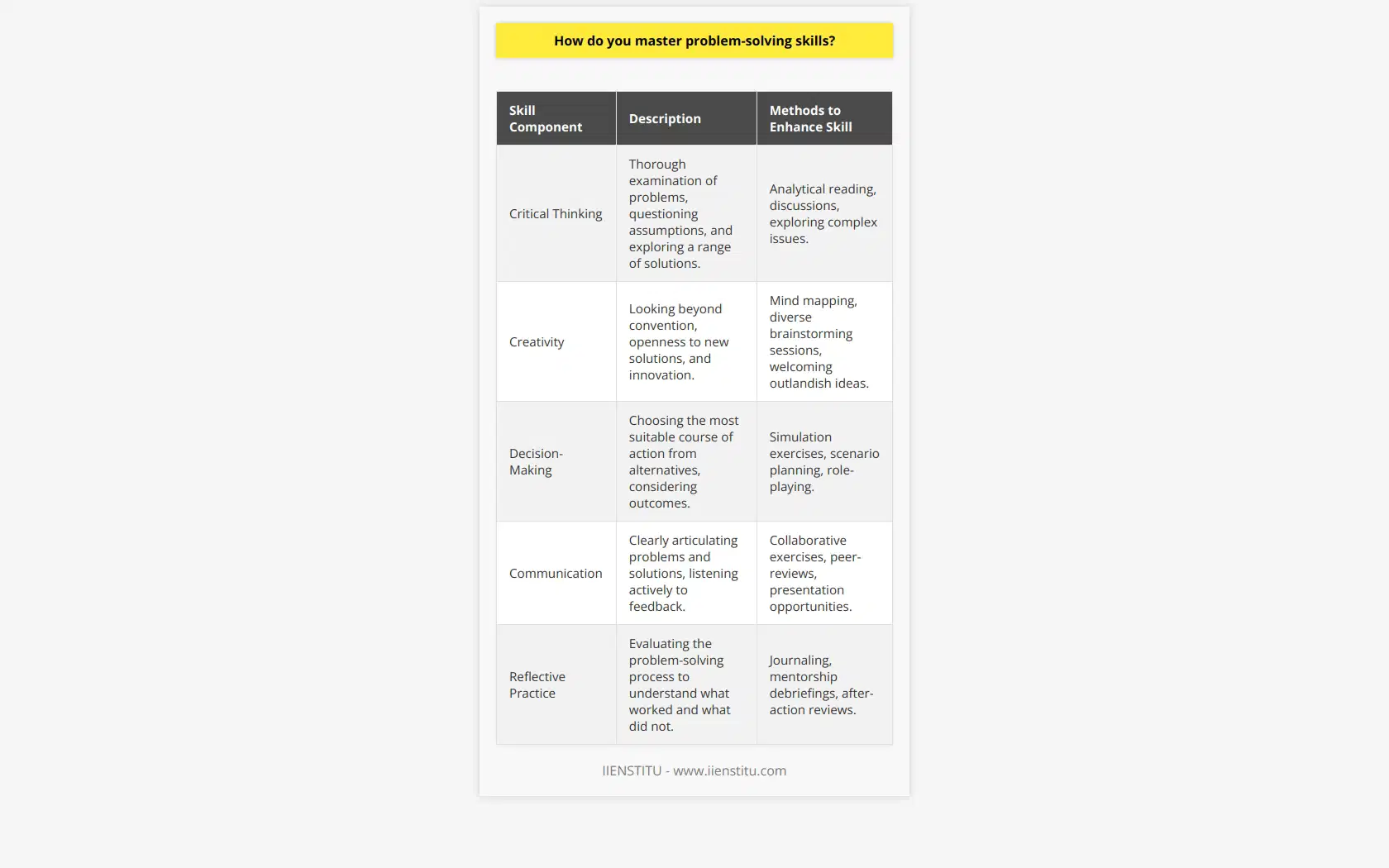
What are 3 key attributes of a good problem solver?
**Analytical Thinking Skills**
The first key attribute of a good problem solver is strong analytical thinking skills. Analytical thinking involves breaking complex problems down into small, manageable parts, and analyzing these components systematically. A good problem solver can identify the underlying patterns, relationships, and possible causes of a problem, which allows them to understand the context in which the issue occurs. Strategic and critical thinking are vital elements of this skill, as they enable one to weigh different options thoughtfully and decide upon the best course of action.
**Creativity and Flexibility**
Another essential characteristic of a skilled problem solver is creativity. This trait involves the ability to innovate and think outside the box for generating novel and effective solutions. One must be open to new perspectives to solve problems that do not fit the conventional molds. In addition to creativity, flexibility is a necessary quality, as it allows a problem solver to adapt their strategies and tactics according to evolving situations. Being open to change and adjusting one's approach as necessary is critical to the problem-solving process.
**Effective Communication Skills**
Lastly, good problem solvers possess strong communication skills, enabling them to convey information clearly, concisely, and persuasively. Communication is crucial in every stage of problem-solving, as an individual must listen actively to understand the problem, articulate their insights and ideas effectively, and collaborate with others to explore multiple viewpoints. Being able to communicate the process and outcome of problem-solving efforts to others is essential for getting buy-in and support from stakeholders, which in turn can lead to more efficient and successful implementation of solutions.
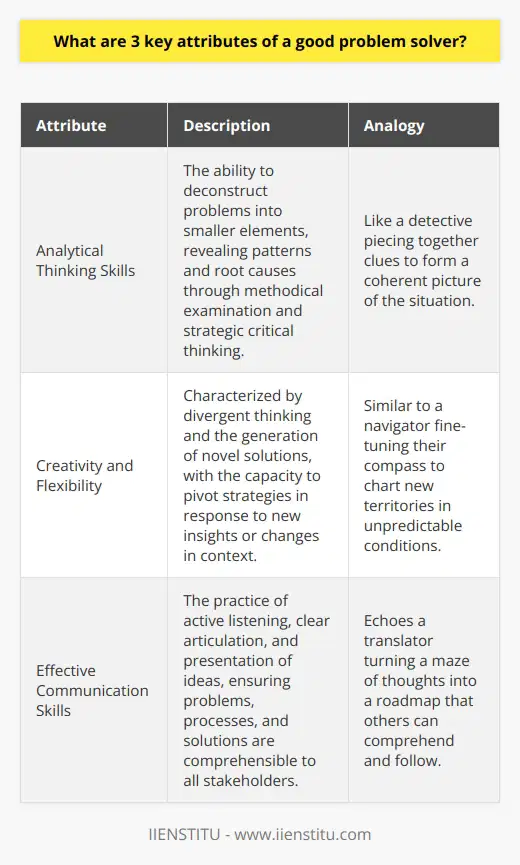
What role does critical thinking play in developing and enhancing problem-solving skills?
Role of Critical Thinking in Problem-Solving Skills Development
Importance of Critical Thinking
Critical thinking plays a significant role in developing and enhancing problem-solving skills, as it enables individuals to systematically and objectively analyze complex situations, issues, or information. This cognitive process fosters deep understanding, encourages questioning, and helps generate innovative solutions to various problems.
Utilizing Logical Reasoning
Critical thinking is integral because it involves assessing the context and validity of arguments or ideas. By applying logical reasoning skills, individuals can identify the most viable options, possible outcomes, and potential risks. This process contributes to effective decision-making, and the ability to solve diverse problems.
Developing Objective Perspectives
A key aspect of critical thinking is the ability to step back from one's own biases, beliefs, and assumptions. By considering multiple perspectives and objectively evaluating the available evidence, individuals become better equipped to address problems creatively, and engage in more nuanced discussions.
Enhancing Analytical Skills
Furthermore, critical thinking helps in developing analytical skills, which are essential for breaking down complex issues into more manageable and comprehensible components. By systematically identifying the underlying causes and associations, individuals can better understand the core of the problem, paving the way for a more informed and effective solution.
Promoting Collaborative Working
When it comes to problem-solving, collaboration and teamwork often play crucial roles. Critical thinking enhances the capacity to engage in fruitful discussions, fostering an environment where diverse viewpoints can be shared and solutions can be collectively reached. Consequently, it bolsters an individual's ability to work and learn collaboratively.
Encouraging Continuous Learning
Lastly, critical thinking fosters a mindset of continuous learning and self-improvement. By constantly seeking to expand one's knowledge base, evaluating assumptions, and acknowledging one's own limitations, critical thinking helps individuals remain adaptable and open to new ideas in their pursuit of effective problem-solving.
In conclusion, critical thinking is instrumental in developing and enhancing problem-solving skills. By fostering logical reasoning, objective perspectives, analytical skills, collaborative working, and continuous learning, critical thinking helps individuals become more proficient in tackling various issues and generating innovative solutions.



